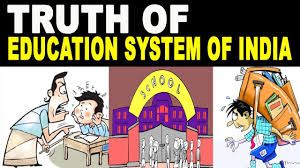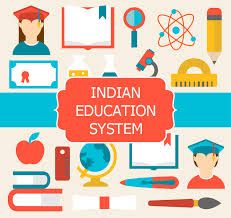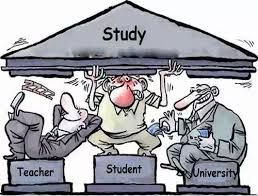Indian Education System
Apr 21, 2019 • 31 views
Academicians and scholars have criticized the existing education system in India as it presents an obsolete but functional entity that has been little evolved in the last so many decades. There are many flaws in the Indian education system and they are quite visible even by having a cursory look.
The modern education system promotes dependent learning and hence decreases the scope of innovation and creativity. Students are told what to learn.Their proactivity declines resulting in a dependent and a dull mind.Always rememberthat formal education will make you a living but self-education will make you a fortune.

To begin with, the contemporary education system in India stresses on the achievement of less significant goals. Most of the youth that receives education consider it as a qualification for employment. They learn and study only with this aim to obtain the desired certificate or degree that would be helpful in getting a job. In recent years there has been a marked shift in the interests of the students towards such academic qualification as would help the employees.
The curriculum, assessments, and practices more or less encourage superficial understanding and not the complete understanding of the subject matter in hand. Children are falling prey to such practices as rote memorization. In certain subjects, the contents are so extensive and the time devoted to them is so less that the student has to force himself to memorize it.

Student reservations in colleges and universities have been responsible for creating unrest among the students and carrying of protest demonstrations on many occasions in the past. The quota decreases the number of seats for the open merit, to which students have been resenting ever since they came into being. The logic behind the reservation is the encouragement of underprivileged classes and their representation. However, the same has been accused of favoring political highlights. This is one of the major flaws in the Indian education system.

There have been no strong reformist movements to set the education system of India right. Although many scholars and experts in the field have expressed their views, not much has been done at the grassroots to overhaul the education system.
Unfortunately, India is one of the developed and developing countries that spend a small percentage of GDP on education. The policies and plans ask for 6 percent of GDP and all it receives is less than 4 percent.
Examination in India, in particular, has no regard for developing the creative side of our students’ career. No attention is paid to the display of individual initiative on the part of the candidate. As a matter of fact, such a system of examination is more harmful to our younger generation than beneficial.
If education aims at the cultivation of the mind and the body and the inherent faculties of the young people, there need be no examinati0on, apart from what the teacher reports about each individual.
Teachers and impartial observers submit their opinion about students concerned. Not only their academic application but also their external activities are weighed upon before they are awarded success. Let us also make an experiment with this system so as to evolve a creative educational standard among our rising generation.
